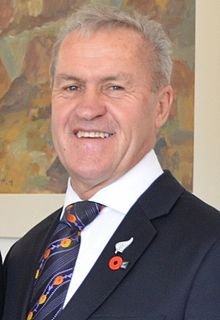Speaker of the New Zealand House of Representatives
| Speaker of the New Zealand House of Representatives | |
|---|---|
 |
|
| Style | The Right Honourable |
| Nominator | New Zealand House of Representatives |
| Appointer | Governor-General of New Zealand at the behest of the House of Representatives |
| Term length |
At Her Majesty's pleasure elected by the House at the start of each Parliament, and upon a vacancy |
| Inaugural holder | Sir Charles Clifford |
| Formation | 1854 |
| Website | Office of the Speaker |
In New Zealand the Speaker of the House of Representatives (Māori: Te Mana Whakawā o te Whare) is the individual who chairs the country's legislative body, the New Zealand House of Representatives (often also referred to as 'Parliament'). The Speaker fulfils a number of important functions in relation to the operation of the House, which is based upon the Westminster parliamentary system. The position is third most important constitutionally, after the Governor-General and the Prime Minister. The current speaker is David Carter.
The Speaker's most visible role is that of presiding over the House when in session. This involves overseeing the order in which business is conducted, and determining who should speak at what time. The Speaker is also responsible for granting or declining requests for certain events, such as a snap debate on a particular issue. An important part of the Speaker's role is ruling on matters of procedure known as 'Points of order' based on Standing Orders and previously made speakers' rulings. This has a large bearing on the smooth running of each parliamentary session. Included in these rules are certain powers available to the Speaker to ensure reasonable behaviour by MPs, including the ability to remove disruptive MPs from the debating chamber.
The Speaker presides over the business of Parliament from the elevated 'Speaker's Chair' behind The Table in the debating chamber.
The Speaker is also responsible for directing and overseeing the administration and security of the buildings and grounds of Parliament (including the Beehive, Parliament House, Bowen House and the Parliamentary Library building), and the general provision of services to members. In doing so, the Speaker consults and receives advice from the Parliamentary Service Commission, which comprises MPs from across the House. The Speaker also presides over some select committees, including the Standing Orders Committee, the Business Committee, and the Officers of Parliament Committee. The Speaker also has some other statutory responsibilities, for example under the Electoral Act 1993. In this role a portion of the Parliament Buildings are given over to the Speaker. Known as the Speaker's Apartments these include his personal office, sitting rooms for visiting dignitaries and a small residential flat which the speaker may or may not use as living quarters.
...
Wikipedia

